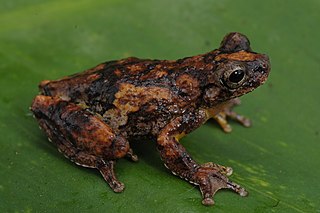
The Atelidae are one of the five families of New World monkeys now recognised. It was formerly included in the family Cebidae. Atelids are generally larger monkeys; the family includes the howler, spider, woolly, and woolly spider monkeys. They are found throughout the forested regions of Central and South America, from Mexico to northern Argentina.

The Colombian red howler or Venezuelan red howler is a South American species of howler monkey, a type of New World monkey, found in the western Amazon Basin in Venezuela, Colombia, Ecuador, Peru and Brazil. The population in the Santa Cruz Department in Bolivia was split off as a separate species, the Bolivian red howler, in 1986, and more recently, splitting off the population in northeastern South America and Trinidad as the Guyanan red howler has occurred. All howler monkeys belong to the family Atelidae and the infraorder Platyrrhini.

The Bolivian red howler is a species of howler monkey, a type of New World monkey, endemic to Bolivia. It can be found in rain forests, including riverine and seasonally flooded forests.

Dendropsophus seniculus is a species of frog in the family Hylidae. It is endemic to Brazil. Its natural habitats are subtropical or tropical moist lowland forests, swamps, freshwater marshes, intermittent freshwater marshes, and rural gardens. It is threatened by habitat loss.
Neottia smithiana is a species of flowering plant in the family Orchidaceae. It is endemic to China.
The red howlers are five species of howler monkeys that used to be considered conspecific:

A camera trap is a camera that is automatically triggered by motion in its vicinity, like the presence of an animal or a human being. It is typically equipped with a motion sensor – usually a passive infrared (PIR) sensor or an active infrared (AIR) sensor using an infrared light beam.

The ursine howler is a species of howler monkey native to Venezuela and possibly Colombia. It is sometimes considered a subspecies of the Venezuelan red howler and classified as Alouatta seniculus arctoidea.

Hylettus is a genus of beetles in the family Cerambycidae, containing the following species:

Hylettus seniculus is a species of longhorn beetle of the subfamily Lamiinae. It was described by Ernst Friedrich Germar in 1824 and is widely distributed throughout South America including Bolivia. It is also known from Costa Rica.

Holopogon is a genus of robber flies in the family Asilidae. There are at least 60 described species in Holopogon.
Holopogon mica is a species of robber flies in the family Asilidae.
Holopogon oriens is a species of robber flies in the family Asilidae.

Conotrachelus seniculus, the amaranth weevil, is a species of true weevil in the beetle family Curculionidae. It is found in North America.
Amotus is a genus of broad-nosed weevils in the beetle family Curculionidae. There are at least three described species in Amotus.
Holopogon wilcoxi is a species of robber flies in the family Asilidae.
Holopogon phaeonotus is a species of robber flies in the family Asilidae.
Holopogon snowi is a species of robber flies in the family Asilidae.
Holopogon pekinensis is a kind of saprotrophic nutrition orchid. In 2017 it was found in Beijing. It grows under a wooded forest in a ravine at an altitude of 1000m in a mountainous area. As of December 2023, Plants of the World Online regarded the genus Holopogon as a synonym of Neottia, and the species Holopogon pekinensis as "unplaced".









